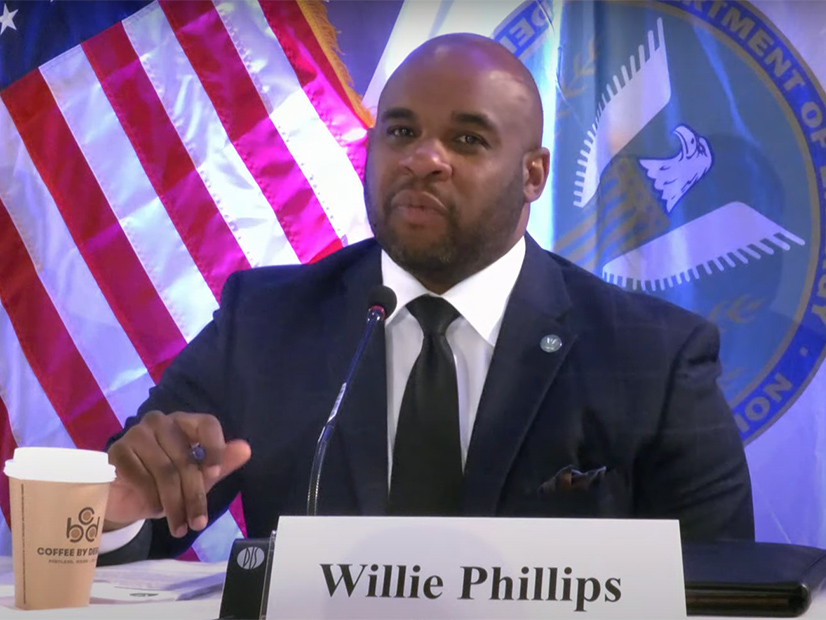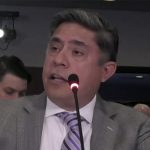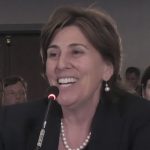FERC commissioners on Tuesday questioned ISO-NE officials and New England state regulators on the region’s short-term winter reliability challenges and the need for the Everett LNG import terminal, at a forum on gas-electric coordination in Portland, Maine.
While much of the discussion focused on similar topics to the FERC reliability forum held in Burlington, Vermont, in September 2022, the tone of this year’s conference was less dire. A joint study released in May by ISO-NE and the Electric Power Research Institute (EPRI) found that the risks of a supply shortfall in New England during extreme winter weather events are “manageable” through 2027, even without Everett, though the RTO has pushed to keep the terminal operating because of longer-term reliability concerns. (See FERC Comes to Vermont and Leaves with a New England-sized Headache and Study: Limited Exposure to Supply Shortfall for ISO-NE During Extreme Weather.)
But this led to skepticism from Commissioner James Danly, who has warned of a looming resource adequacy crisis because of retiring fossil fuel-fired generators. He repeatedly questioned RTO officials on the study’s assumptions.
One of the findings of the study was that behind-the-meter solar was underestimated.
“I have to admit, I’m surprised to think that the hopes for winter reliability in New England hang entirely on one set of assumptions on one technology that is ‘surprisingly’ being deployed at the rate that it is,” Danly told ISO-NE COO Vasmi Chadalavada. He asked what other assumptions have changed since last year.
Chadalavada noted that the RTO’s position that Everett should be retained has not changed, but that the study focused on the electric system, not the gas system.
“In the longer run, I’m still as concerned as I’ve ever been,” ISO-NE CEO Gordon van Welie told the commissioners. “I think it would be extremely unwise were we to let that facility go until we know where we are with regard to these variables.”
Commissioner Allison Clements said she found the study to be “really comprehensive” and that it “provides key parameters to consider, and the resulting low odds of load shedding are encouraging.” She acknowledged, however, that ISO-NE “notes itself that it’s not equipped to assess the gas system’s effects without Everett because only” the gas industry “can speak to that.”
Vermont Department of Public Service Commissioner June Tierney observed that “nine months ago, the message was, ‘Oh my word, the sky is falling’; today the message is, ‘Well, we’ve got some breathing room.’”
“I can relate to the bewilderment sense that Commissioner Danly has,” she continued, as nothing seems to have materially changed since the Burlington conference. But, she said, ISO-NE “did the analysis, and they’re to be congratulated for that. And it being ISO’s analysis, I have no question that it was done well.”
She advised FERC to formally solicit information from ISO-NE about the assumptions and inputs that it used for the study, not just for its ratemaking benefit but also for public transparency.
Everett
Much of the daylong forum’s discussions focused on Everett and the Mystic plant.
Richard Levitan, president of the consulting firm Levitan & Associates, called Everett “the insurance that helps to safeguard both electric and gas reliability on extremely cold days.”
Carrie Allen of Constellation Energy — the parent company of both Everett and its primary customer, the Mystic generation plant — agreed that the facility is needed and added that the region is “running out of time” to keep the plant open, noting the long regulatory process that would be required if an agreement is reached.
New Hampshire Consumer Advocate Donald Kreis, however, said ratepayers have been overpaying for reliability “insurance,” and he opposes burdening consumers with additional costs from new reliability programs.
“We can design markets to force ratepayers to buy every last aliquot of reliability that industry can conjure, but I beg you not to do that,” Kreis said. “In particular, I beg ISO New England not to seek, and I beg FERC not to approve, some new market mechanism — or worse, some out-of-market mechanism — to guarantee that the Everett terminal stays in business.”
In written comments submitted to FERC for the forum, Kreis expressed concern about the true benefits of the current Mystic agreement, designed to keep the generator in service through this winter. He cited the extreme weather conditions on Dec. 24 that required ISO-NE to declare a capacity deficiency as an example of what he said were dubious reliability benefits provided by the agreement.
“It was shocking to learn that Mystic station had not been dispatched as a resource adequacy crisis loomed, given the vast sums of free money that had been awarded to the facility’s owners via the FERC-approved reliability-must-run arrangement,” Kreis wrote.
In contrast, gas utility and pipeline industry representatives expressed their concern that ISO-NE is underestimating the reliability risks to the region and argued that the region should maintain Everett and look to build additional gas infrastructure to address reliability concerns.
James Holodak of National Grid said that until renewables can displace significant natural gas demand in the region, “the prudent decision would be to keep Everett open” while expressing his frustration with the difficulties of constructing new natural gas infrastructure in the region.
“All the solutions that we’re talking about are fairly expensive relative to the potential for a new pipeline into the area,” Holodak said.
Ernesto Ochoa of Kinder Morgan said the penetration of renewables will increase the need for gas infrastructure.
“We believe that more infrastructure is needed in the region, not less, and we’re going to continue to say so forever,” Ochoa said.
Richard Paglia of Enbridge agreed on the need for additional gas infrastructure to bring more natural gas to the region.
“To me, the glue that holds all of this together are the gas plants that are highly dispatchable … but we don’t have the supply to allow those plants to run when needed,” Paglia said.
Massachusetts Energy and Environmental Affairs Secretary Rebecca Tepper pushed back on the idea that the region should pursue additional gas infrastructure.
“The region’s problem is an overreliance on natural gas,” Tepper said, saying policymakers need to focus on valuing storage, energy efficiency and demand response programs. She declined to give a definitive answer as to whether Gov. Maura Healey’s administration supports the retention of Everett beyond the end of the Mystic agreement.
Notable Absences
Energy industry representatives and state regulators made up a large number of speakers at the forum, which notably lacked direct representation of environmental justice or climate-focused organizations, while Kreis was the only ratepayer advocate to serve as a panelist.
“I think this hearing would have benefited from some additional voices today, particularly from the environmental and environmental justice communities, and particularly [from the city] of Everett,” Tepper said.
Vermont Commissioner Tierney echoed Tepper’s comments, saying, “There are voices out there of people who have not been a part of these discussions to date, and who are also not being directly addressed by this conversation.”
She noted that officials often stress the importance of gas during the transition to clean energy: “Every time we say that there are people saying, ‘Do you not get it? We need to stop burning fossil fuels.’”
“I worry that our conversation today — which, again, was expert and highly incisive and elucidating — I worry about it coming across as tone deaf. … The problem I see continues to be, to the folks we’re trying to reach — the hearts and minds that need to join us in this process — they continue to feel like they’re not included in the study thinking.”
While environmental justice groups were not included as speakers at the forum, several groups did submit written comments or release statements about it, including the Berkshire Environmental Action Team, No Coal No Gas and the Fix the Grid Coalition.
“As fossil fuel-dominated interests gather in Portland, Maine, on June 20 for the 2023 New England Winter Gas-Electric Forum, we expect them to double down on rhetoric that we need even more fossil fuel infrastructure, in the name of reliability,” No Coal No Gas wrote in a statement prior to the event. “Yet we expect that most of the panelists will be silent on lessons learned from the most recent epitome of winter reliability failure, a widespread failure of fossil fuel generators (particularly gas generators) to deliver on Dec. 24, 2022, a cold snap when they were most needed.”
In a letter signed by representatives of local climate and environmental justice organizations, Fix the Grid called for a “more holistic approach to grid planning and management,” taking into account “the public health and environmental impacts of current and future winter reliability policies and programs, including markets, on low-income environmental justice communities across New England.”
The campaign also advocated for an analysis of the reliability potential of increased transmission, energy storage and demand-side solutions including demand response, energy efficiency and conservation.
“We would like to see FERC encourage ISO New England to work with states and public interest organizations to envision a reliable grid that is also affordable and sustainable for all communities,” the group wrote







